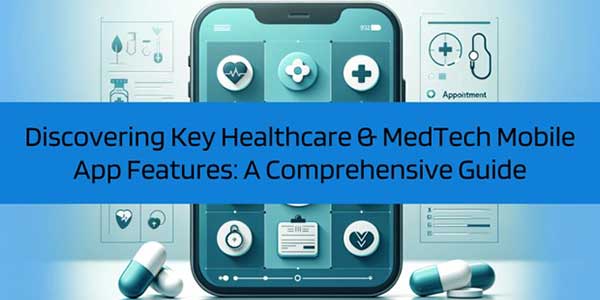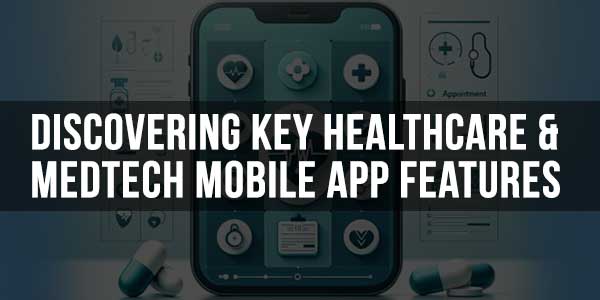
In the dynamic landscape of healthcare, mobile apps have become indispensable tools, revolutionizing patient care and medical practices. “Discovering Key Healthcare & MedTech Mobile App Features” serves as your compass, navigating the crucial elements that define these applications. Join us as we delve into the world of healthcare technology, providing insights into the features that matter and considerations for unlocking the full potential of MedTech mobile apps.
Table of Contents
Navigating The Healthcare App Landscape:
The Evolution Of Healthcare Technology:
Explore the transformative journey of healthcare technology, from traditional practices to the emergence of mobile applications. Understand the role of MedTech in streamlining processes, improving patient outcomes, and enhancing overall healthcare delivery.
Importance Of Mobile Apps In Patient Engagement:
Uncover how mobile apps contribute to patient engagement, empowering individuals to actively participate in their healthcare journeys. From appointment scheduling to real-time health monitoring, discover the diverse functionalities that enhance patient engagement.
Integrating Telehealth Solutions:
Dive into the realm of telehealth within healthcare apps, examining the role of virtual consultations, remote monitoring, and telemedicine in expanding healthcare accessibility. Explore how these features bridge the gap between patients and healthcare providers.
Essential Features Shaping Healthcare Apps:
Electronic Health Records (EHR) Management:
Delve into the significance of EHR management within healthcare apps. Explore how these platforms facilitate seamless access to patient records, ensuring healthcare providers have comprehensive and real-time information at their fingertips.
Medication Management And Reminders:
Uncover the features dedicated to medication management, offering timely reminders, dosage tracking, and medication adherence support. Understand how these functionalities improve patient compliance and contribute to better health outcomes.
Health And Fitness Tracking:
Explore the integration of health and fitness tracking features, allowing users to monitor physical activity, nutrition, and overall wellness. Discover how these features promote a holistic approach to healthcare, emphasizing preventive measures.

Addressing Security And Privacy Concerns:
Robust Data Security Measures:
Understand the critical importance of robust security measures in healthcare apps. Explore how encryption, secure authentication, and adherence to data protection regulations ensure the confidentiality and integrity of patient information.
Privacy-Centric Design:
Examine the concept of privacy-centric design in healthcare apps, focusing on user consent, transparent data practices, and the ethical handling of sensitive health information. Discover how these design principles build trust among app users.
Discovering Key Healthcare & MedTech Mobile App Features:
AI And Machine Learning Applications:
Uncover the transformative impact of AI and machine learning in healthcare apps. Explore predictive analytics, diagnostic support, and personalized healthcare recommendations, highlighting the role of intelligent technologies in improving patient care.
Frequently Asked Questions (FAQs):
Q: Are healthcare apps secure for storing sensitive patient information?
A: Yes, reputable healthcare apps implement robust security measures, including encryption and secure authentication, to ensure the secure storage of sensitive patient information.
Q: How do health and fitness tracking features contribute to overall wellness?
A: Health and fitness tracking features empower users to monitor physical activity, nutrition, and wellness, promoting a holistic approach to healthcare and preventive measures.
Q: Can healthcare apps integrate with existing Electronic Health Records (EHR) systems?
A: Many healthcare apps offer integration with existing EHR systems, providing healthcare providers with seamless access to comprehensive patient records.
Q: What role do AI and machine learning play in healthcare apps?
A: AI and machine learning in healthcare apps contribute to predictive analytics, diagnostic support, and personalized healthcare recommendations, enhancing the overall quality of patient care.
Q: How do mobile apps enhance patient engagement in healthcare?
A: Mobile apps contribute to patient engagement by offering features such as appointment scheduling, real-time health monitoring, and access to healthcare resources, empowering individuals to actively participate in their healthcare journeys.
Q: Are there guidelines for designing healthcare apps with user privacy in mind?
A: Yes, privacy-centric design principles, including transparent data practices and user consent, guide the ethical design of healthcare apps to prioritize user privacy.
Bottom Line:
In conclusion, “Discovering Key Healthcare & MedTech Mobile App Features” provides a holistic exploration of the features shaping the landscape of healthcare technology. From patient engagement to robust security measures and the integration of intelligent technologies, this guide equips you with the knowledge to navigate the dynamic world of healthcare apps. Embrace the future of healthcare, where technology enhances patient care and transforms the delivery of medical services.

 About the Author:
About the Author:
















This article emphasizes the critical role of security in healthcare and medtech mobile apps, especially for IoT-driven solutions. Robust, HIPAA-compliant measures are vital for revenue cycle management, ensuring financial processes remain secure and reliable.
Welcome here and thanks for reading our article and sharing your view. This will be very helpful to us to let us motivate to provide you with more awesome and valuable content from a different mind. Thanks again.